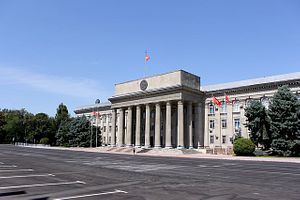Freedom House’s annual Nations in Transit report is a yearly reminder that progress is not inevitable and democracy not necessarily a permanent state of being. Last year’s report remarked on a dozen years of democratic backsliding across the countries of the former Soviet Union and this year’s report underscores the continuation of that trend.
“For the first time in the NIT project’s history, there are now more Consolidated Authoritarian Regimes than Consolidated Democracies,” one of the report’s key findings says.
The report scores each state on seven indicators — national and local democratic governance, electoral process, civil society, independent media, judicial framework and independence, and corruption — and averages those scores to arrive at the country’s “democracy score.” The democracy scores range from 1 (a consolidated democracy) to 7 (a consolidated authoritarian regime). Eighteen of the 29 countries covered by the report saw a decline in their democracy scores over the course of 2016.
While the countries of Central and Eastern Europe are largely outside of our Asia-centric purview here, the report’s mediation on the rise of populism in Europe is particularly important. The report astutely holds Eurasia’s consolidated autocracies up as a lesson worth examining for those European countries leaning into illiberalism.
“At its core,” the report says, populism “pits a mystically unified ‘nation’ against corrupt ‘elites’ and external enemies, and claims for a charismatic leader the power to voice the will of the nation.” Populism, the report states, rejects democratic restraints on the majority will and sets aside the necessity for checks on the power of the leader. It “feeds on the gap between what mainstream political leaders promise and what they deliver,” capitalizing on fears regarding erosion of identity, rising inequality, and economic insecurity in populations which were promised prosperity via democracy.
The NIT report’s map is a demonstration in the range of political situations across the former Soviet Union. Inescapable is the visual conclusion that as one moves south and eastward, democracy’s roots grow thin. It’s perhaps more accurate to say that in Eurasia, democracy — as Western nations view it — never really took root.
One lesson Eurasia’s bloc of consolidated authoritarian states has for Europe’s populists is the simple truth that illiberalism won’t solve the state’s internal social and economic problems.
“The authoritarian regimes in Eurasia have proven that they are capable of retaining power, but not of creating efficient or effective, much less representative, states,” the report notes.
Governments in Turkmenistan, Uzbekistan, Tajikistan, Kazakhstan, and Kyrgyzstan — which for the first time since 2011 has declined into the “consolidated authoritarian regimes” category — may be able to suppress dissent from opposition politicians, civil society, and media, “but the popular grievances they would normally channel remain.”
In Uzbekistan, which has long sat at the bottom of the ranking, the report sees an opening for improvement — but it may not be easy. For example, reforming the country’s longstanding policy of keeping a nonconvertible local currency would be beneficial in the long run but liberalizing the country’s economy “will likely result in significant short-term suffering,” threatening new President Shavkat Mirziyoyev’s position.
The case of Kyrgyzstan is demonstrative of the fact that democratic progress is not necessarily linear nor inevitable. The country has removed two presidents via popular revolt, in 2005 and 2010. Each time, the Kyrgyz people were promised democracy and economic progress by the new leaders and each time reality has fallen short of the promise.
“Kyrgyzstan’s slide back to authoritarianism shows the failed promise of the 2010 revolution,” Nate Schenkkan, project director of Nations in Transit, said in the report’s press release. As the country heads toward a presidential election later this year, President Almazbek Atambayev “seems intent on repeating the mistakes of his predecessors by cracking down on opposition and the media.”

































